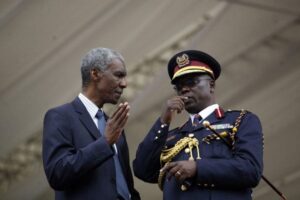The security challenges that the country has faced over the past year with the upsurge in terrorism — notably the Westgate Mall attack in Nairobi last September and a series of bombings and grenade attacks in Nairobi and Mombasa — and still unexplained outbreaks of violence such as the killings in Lamu have raised public questions on the intelligence service’s effectiveness.
The security situation has brought to the public eye unprecedented squabbles between the security services.
The Westgate attack that killed some 70 people nearly a year ago after a four-day siege sparked a publicblame game and turf wars between Gen Gichangi’s National Intelligence Service, the Kenya Defence Forces commanded by the increasingly influential Gen Julius Karangi, and the National Police Service led by Inspector-General David Kimaiyo.
LAMU KILLINGS
With questions being asked in Parliament and elsewhere about glaring security failures, the usually secretive spy service took the unusual step of letting it be publicly known that it had given advance intelligenceinformation to the police on the likelihood of an impending attack, but the advice was ignored.
A similar scenario was repeated following the Lamu killings when information was again let out that intelligence advisories ahead of the attacks were not acted on.
In the meantime, Gen Karangi, the military commander, seems to have supplanted the intelligence chief as President Uhuru Kenyatta’s most trusted security advisor.
In the statement announcing Gen Gichangi’s resignation, President Kenyatta praised the intelligence chief for his commitment, dedication, professionalism and distinguished service, but cited only unspecified “personal grounds” as reason for the surprise resignation.
That it was announced as resignation rather than retirement might probably be a clear sign that Gen Gichangi, who enjoys security of tenure, vacated office prematurely in circumstances that beg closer scrutiny.
As chief of the National Intelligence Service, the former Kenya Airforce fighter pilot who previously served in military intelligence and as head of the then National Counter-terrorism Centre, has had to withstand some political pressure since the Jubilee coalition government of President Kenyatta and Deputy President William Ruto came to office in April last year.
FIXED RUTO
From early on, Mr Ruto’s key supporters in the URP wing of the ruling coalition led by Kericho Senator Charles Keter launched a loud campaign against the intelligence chief and other key security figures inherited from President Mwai Kibaki’s regime. The cause was later taken up by rebellious Nandi Hills MP Alfred Keter.
Their grouse was that Gen Gichangi, together with figures such as National Security PS Mutea Iringo (who now moves to the ministry of Defence), Secretary to the Cabinet Francis Kimemia and State House advisor Nancy Gitau had in 2008 submitted evidence to the International Criminal Court that was used to indict Mr Ruto in the crimes against humanity charges arising out of the post-election violence.
The Uhuru-Ruto machinery also had further reason to discredit Gen Gichangi. They believed that he was one of the key authors of the pre-election manoeuvres that sought to edge Mr Kenyatta out of the Kibaki succession race on account of the ICC cases and prop up former Vice-President Musalia Mudavadi in his stead.
The move came unstuck when Mr Kenyatta, after initially appearing to give way to Mr Mudavadi, recanted his decision and stepped spectacularly back into the campaign.
By MACHARIA GAITHO
-nation.co.ke




No comments:
Post a Comment